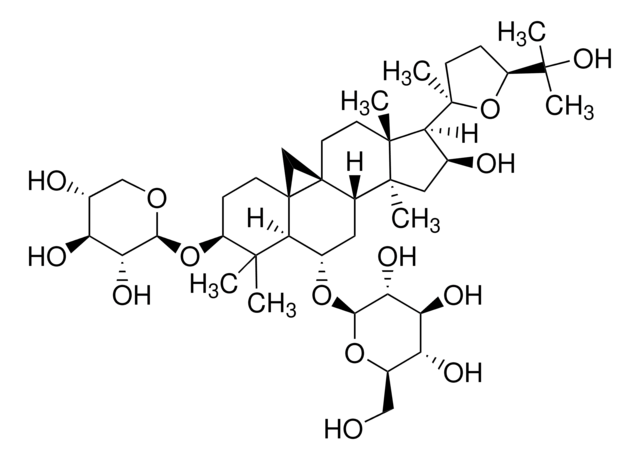92544
Abberior® FLIP 565, maleimide
for single-molecule switching microscopy (e.g. PALM, STORM, GSDIM)
Sign Into View Organizational & Contract Pricing
All Photos(1)
About This Item
UNSPSC Code:
12352111
NACRES:
NA.32
Recommended Products
form
solid
concentration
≥50.0% (degree of coupling)
solubility
DMF: 0.25 mg/mL, clear
fluorescence
λex 565 nm; λem 580 nm±5 nm in PBS, pH 7.4
storage temp.
−20°C
General description
Absorption Maximum (off-state) λmax:314 nm (PBS, pH 7.4)
Extinction Coefficient, ε(λmax): 47,000 M-1cm-1 (MeOH)
Fluorescence Maximum, λfl:580 nm (PBS, pH 7.4)
Photoactication Wavelength: 310-380 (one-photon activation)
650-800 (two-photon activation)
Fluorescence Quantum Yield, η: 0.38 (PBS, pH 7.4)
Extinction Coefficient, ε(λmax): 47,000 M-1cm-1 (MeOH)
Fluorescence Maximum, λfl:580 nm (PBS, pH 7.4)
Photoactication Wavelength: 310-380 (one-photon activation)
650-800 (two-photon activation)
Fluorescence Quantum Yield, η: 0.38 (PBS, pH 7.4)
Application
Abberior® FLIP 565 conjugated with secondary antibody has been used for STORM (stochastic optical reconstruction microscopy) imaging of COS-7 and S180 cells.
Suitability
Designed and tested for fluorescent super-resolution microscopy
Other Notes
Legal Information
abberior is a registered trademark of Abberior GmbH
related product
Product No.
Description
Pricing
Storage Class Code
11 - Combustible Solids
WGK
WGK 3
Flash Point(F)
Not applicable
Flash Point(C)
Not applicable
Certificates of Analysis (COA)
Search for Certificates of Analysis (COA) by entering the products Lot/Batch Number. Lot and Batch Numbers can be found on a product’s label following the words ‘Lot’ or ‘Batch’.
Already Own This Product?
Find documentation for the products that you have recently purchased in the Document Library.
Remi Galland et al.
Nature methods, 12(7), 641-644 (2015-05-12)
Single-objective selective-plane illumination microscopy (soSPIM) is achieved with micromirrored cavities combined with a laser beam-steering unit installed on a standard inverted microscope. The illumination and detection are done through the same objective. soSPIM can be used with standard sample preparations
Marcus Dyba et al.
Nature biotechnology, 21(11), 1303-1304 (2003-10-21)
We report immunofluorescence imaging with a spatial resolution well beyond the diffraction limit. An axial resolution of approximately 50 nm, corresponding to 1/16 of the irradiation wavelength of 793 nm, is achieved by stimulated emission depletion through opposing lenses. We
Nicolas Olivier et al.
Biomedical optics express, 4(6), 885-899 (2013-06-14)
3D STORM is one of the leading methods for super-resolution imaging, with resolution down to 10 nm in the lateral direction, and 30-50 nm in the axial direction. However, there is one important requirement to perform this type of imaging:
T A Klar et al.
Optics letters, 24(14), 954-956 (2007-12-13)
We overcame the resolution limit of scanning far-field fluorescence microscopy by disabling the fluorescence from the outer part of the focal spot. Whereas a near-UV pulse generates a diffraction-limited distribution of excited molecules, a spatially offset pulse quenches the excited
Volker Westphal et al.
Physical review letters, 94(14), 143903-143903 (2005-05-21)
Utilizing single fluorescent molecules as probes, we prove the ability of a far-field microscope to attain spatial resolution down to 16 nm in the focal plane, corresponding to about 1/50 of the employed wavelength. The optical bandwidth expansion by nearly
Our team of scientists has experience in all areas of research including Life Science, Material Science, Chemical Synthesis, Chromatography, Analytical and many others.
Contact Technical Service




